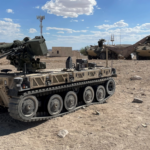
The Army has selected six companies to participate in a new cohort to find field artillery autonomous resupply (FAAR) technologies, with the chance for each to pitch their concepts to officials at the end of the 12-week program in April. The FAAR cohort is part of the new Army Capability Accelerator approach to help bring in more non-traditional partners on applied research projects as Futures Command looks for emerging technologies that can be applied to major weapon systems programs. “Sourced…

 By
By 










